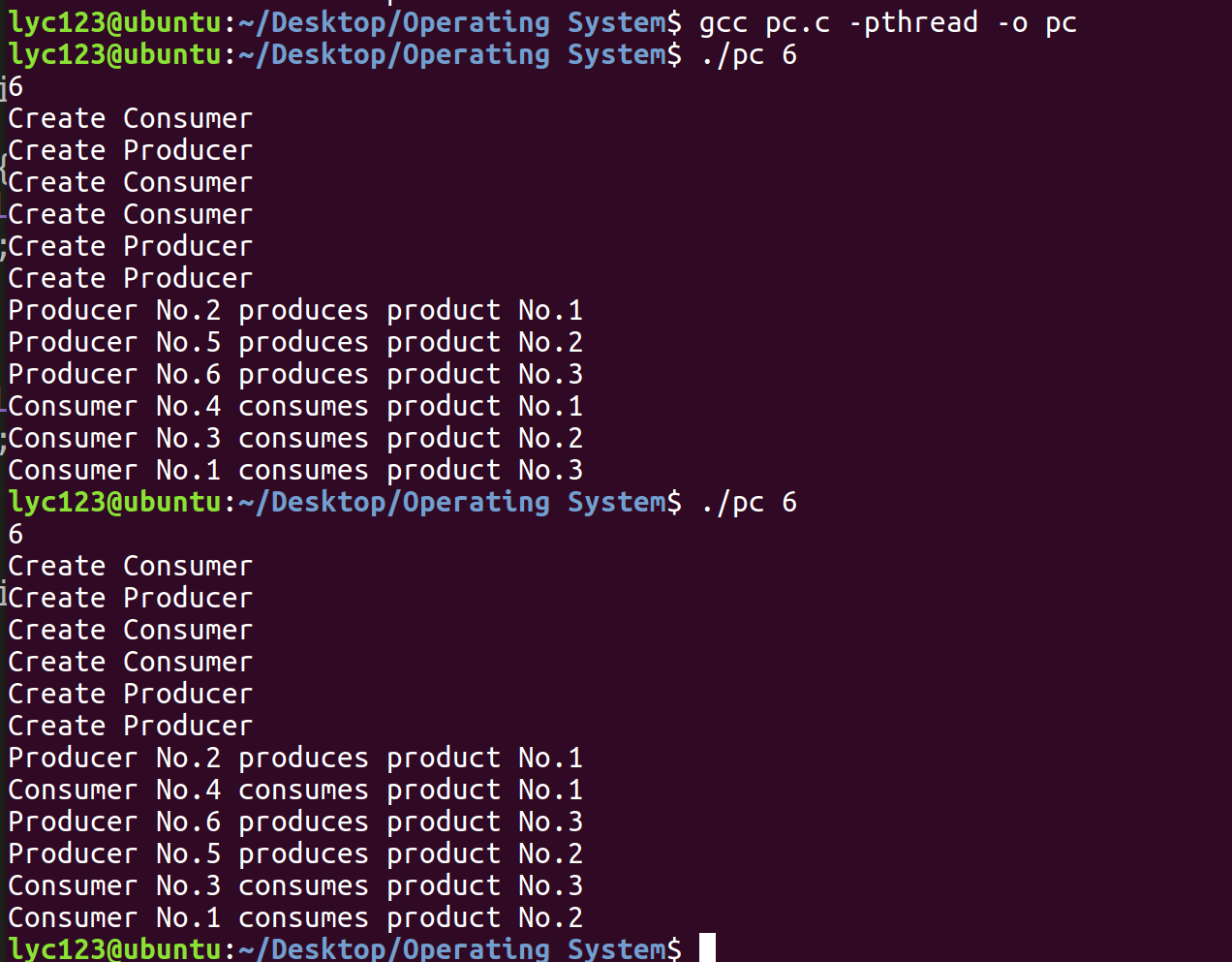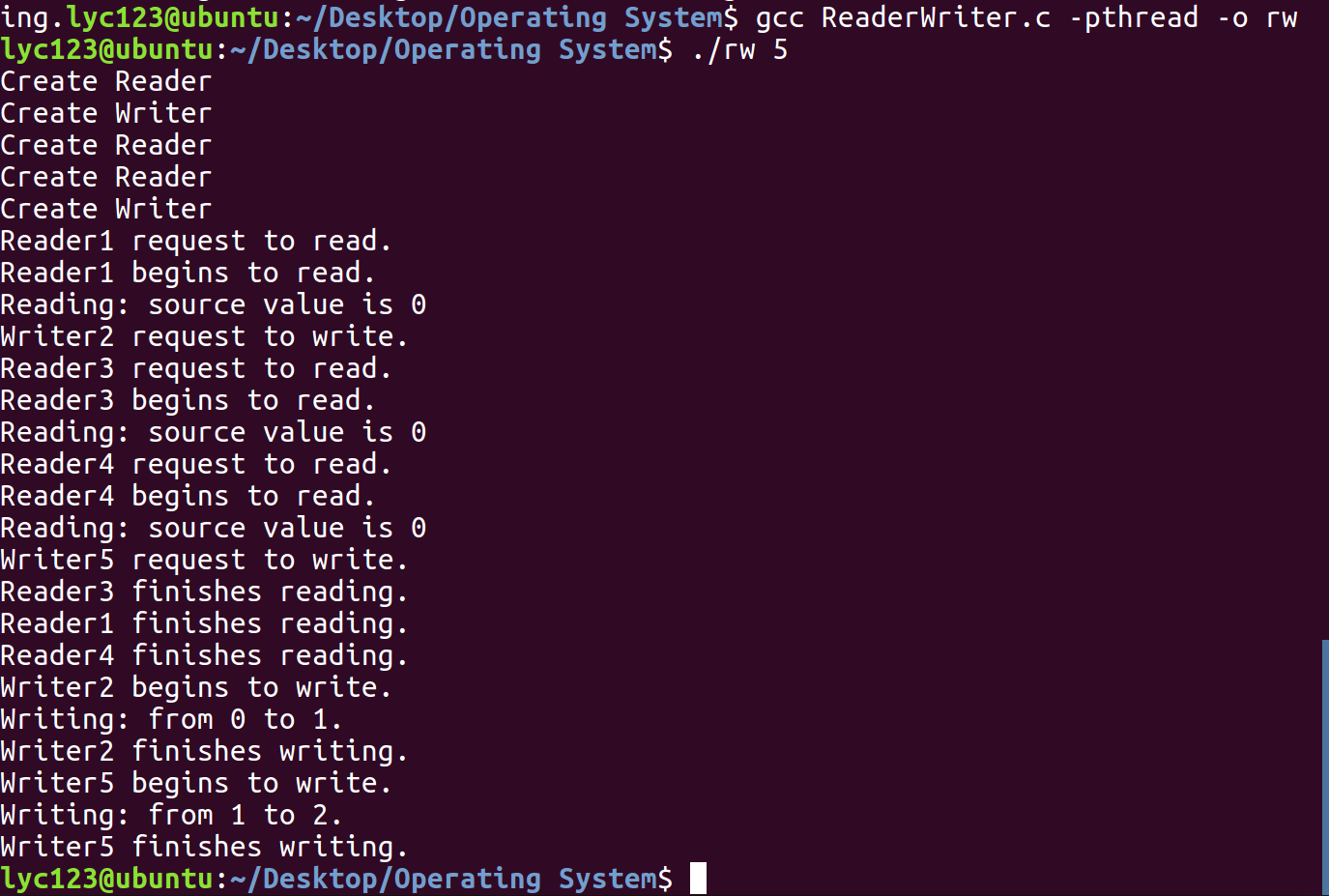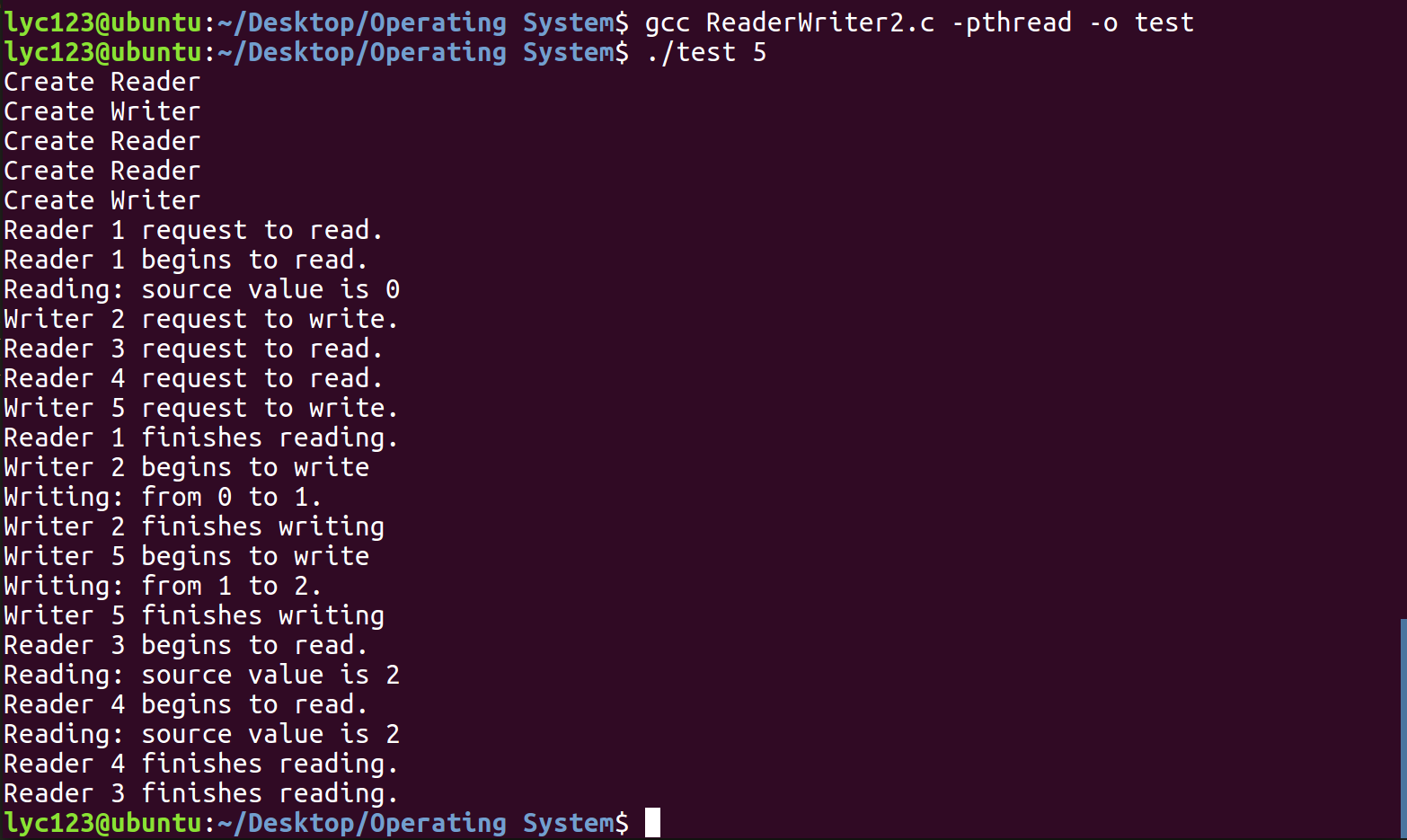介绍 同步互斥问题是操作系统学科中一个很重要的问题,要讲明白同步互斥问题,我先来介绍竞争状态 。所谓竞争状态 ,是指多个进程对于同一块数据进行访问,其访问顺序会影响执行结果。对于这一类数据,我们需要对访问它的进程作限制,即保持该数据访问的互斥性。但是,如果我们只是读取 该数据,访问顺序将不会影响执行结果;如果是写 ,这就是同步互斥问题的主要内容。
解决同步互斥问题有三个要求:
互斥性:即当一个进程访问临界资源的时候,互斥的进程不能访问该数据。
有空让进:当临界资源没有被占有的时候,在等待的进程可以访问到该资源,这里涉及到进程的调度算法。
有限等待:一个进程请求资源的等待时间是有限的。等待方式有忙等待 和让权等待 。忙等待指该进程占有CPU等待访问该资源,优点是可以降低系统的多道程序的度,缺点是占有CPU。让权等待指请求资源的进程让出CPU,直至该资源可以被占有。优点是可以让出CPU用作其他地方,缺点是需要进行上下文切换,可能引起系统抖动现象。
这个实验包括两个很经典的问题:
生产者-消费者问题 问题要求 设计一个程序来解决有限缓冲问题,其中的生产者与消费者进程如图6.10 与图6.11 所示。empty (以记录有多少空位)、full (以记录有多少满位)以及mutex (二进制信号量或互斥信号量,以保护对缓冲插入与删除的操作)。对于本项目,empty与full将采用标准计数信号量 ,而mutex将采用二进制信号量 。生产者与消费者作为独立线程,在empty、full、mutex 的同步前提下,对缓冲进行插入与删除。
输入格式 测试数据文件包括n行测试数据,分别描述创建的n个线程是生产者还是消费者,以及生产者或消费者存放或取产品的开始时间和持续时间。每行测试数据包括四个字段,各个字段间用空格分隔。第一字段为一个正整数,表示线程序号。第二字段表示相应线程角色,P表示生产者,C表示消费者。第三字段为一个正数,表示存放或取出操作的开始时间:线程创建后,延迟相应时间(单位为秒)后发出对共享资源的使用申请。第四字段为一个正数,表示操作的持续时间。第五字段为一个正数(仅生产者有),表示生产的产品号。当线程申请成功后,开始对共享资源的操作,该操作持续相应时间后结束,并释放共享资源。
输入
1 C 3 5
注意 :在创建数据文件时,由于涉及到文件格式问题,最好在记事本中手工逐个键入数据,而不要拷贝粘贴数据,否则,本示例程序运行时可能会出现不可预知的错误。
代码实现 buffer.h文件如下:
1 2 typedef int buffer_item;#define BUFFER_SIZE 5
pc.cpp文件如下:
1 2 3 4 5 6 7 8 9 10 11 12 13 14 15 16 17 18 19 20 21 22 23 24 25 26 27 28 29 30 31 32 33 34 35 36 37 38 39 40 41 42 43 44 45 46 47 48 49 50 51 52 53 54 55 56 57 58 59 60 61 62 63 64 65 66 67 68 69 70 71 72 73 74 75 76 77 78 79 80 81 82 83 84 85 86 87 88 89 90 91 92 93 94 95 96 97 98 99 100 101 102 103 104 105 106 107 108 109 110 111 112 113 114 115 116 117 118 119 120 121 122 123 124 125 126 127 128 129 130 131 132 133 134 135 136 137 138 139 140 141 142 143 144 145 146 147 148 149 150 151 152 153 154 155 156 157 158 159 #include "buffer.h" #include <semaphore.h> #include <pthread.h> #include <stdio.h> #include <unistd.h> #include <stdlib.h> sem_t empty, full, mutex;buffer_item buffer[BUFFER_SIZE]; int nextp = 0 ;int nextc = 0 ;struct cmd { int pid; char type; int startTime; int lastTime; int num; }; int insert_item (buffer_item item) buffer[nextp] = item; nextp = (nextp + 1 ) % BUFFER_SIZE; return 0 ; } int remove_item (buffer_item* item) *item = buffer[nextc]; buffer[nextc] = 0 ; nextc = (nextc + 1 ) % BUFFER_SIZE; return 0 ; } void *producer (void *param) struct cmd * item = while (1 ) { sleep(item->startTime); sem_wait(&empty); sem_wait(&mutex); insert_item(item->num); printf ("Producer No.%d produces product No.%d\n" , item->pid, item->num); sleep(item->lastTime); sem_post(&mutex); sem_post(&full); pthread_exit(0 ); } } void *consumer (void * param) struct cmd * item = while (1 ) { sleep(item->startTime); sem_wait(&full); sem_wait(&mutex); remove_item(&item->num); printf ("Consumer No.%d consumes product No.%d\n" , item->pid, item->num); sleep(item->lastTime); sem_post(&mutex); sem_post(&empty); pthread_exit(0 ); } } int main (int argc, char const *argv[]) int threadNum = atoi(argv[1 ]); struct cmd commands [threadNum ]; pthread_t pid[threadNum]; sem_init(&empty, 0 , BUFFER_SIZE); sem_init(&full, 0 , 0 ); sem_init(&mutex, 0 , 1 ); int nextp = 0 ; int nextc = 0 ; for (int i = 0 ; i < BUFFER_SIZE; i++) { buffer[i] = 0 ; } char text[256 ]; int j = 0 ; char ch; FILE *fpRead=fopen("test.txt" ,"r" ); if (fpRead==NULL ) { return 0 ; } while ((ch=fgetc(fpRead))!=EOF) { if (ch != ' ' && ch != '\n' && ch != '\r' ) text[j++] = ch; } j = 0 ; for (int i = 0 ; i < threadNum; i++) { commands[i].pid = text[j++] - '0' ; commands[i].type = text[j++]; commands[i].startTime = text[j++] - '0' ; commands[i].lastTime = text[j++] - '0' ; if (commands[i].type == 'P' ) { commands[i].num = text[j++] - '0' ; } } for (int i = 0 ; i < threadNum; i++) { if (commands[i].type == 'C' ) { pthread_create(&pid[i], NULL , consumer, &commands[i]); printf ("Create Consumer\n" ); } else { pthread_create(&pid[i], NULL , producer, &commands[i]); printf ("Create Producer\n" ); } } for (int i = 0 ; i < threadNum; i++) { pthread_join(pid[i], NULL ); } sem_destroy(&mutex); sem_destroy(&full); sem_destroy(&empty); return 0 ; }
编译执行上述代码,结果如下:
读者-写者问题 问题要求 在Linux环境下,创建一个进程,此进程包含n个线程。用这n个线程来表示n个读者或写者。每个线程按相应测试数据文件(后面有介绍)的要求进行读写操作。用信号量机制分别实现读者优先和写者优先的读者-写者问题。
读者-写者问题的读写操作限制(仅读者优先或写者优先):
1)写-写互斥,即不能有两个写者同时进行写操作。
2)读-写互斥,即不能同时有一个线程在读,而另一个线程在写。
3)读-读允许,即可以有一个或多个读者在读。
读者优先的附加限制:如果一个读者申请进行读操作时已有另一个读者正在进行读操作,则该读者可直接开始读操作。
输入格式 测试数据文件包括n行测试数据,分别描述创建的n个线程是读者还是写者,以及读写操作的开始时间和持续时间。每行测试数据包括四个字段,各个字段间用空格分隔。第一字段为一个正整数,表示线程序号。第二字段表示相应线程角色,R表示读者,W表示写者。第三字段为一个正数,表示读写操作的开始时间:线程创建后,延迟相应时间(单位为秒)后发出对共享资源的读写申请。第四字段为一个正数,表示读写操作的持续时间。当线程读写申请成功后,开始对共享资源的读写操作,该操作持续相应时间后结束,并释放共享资源
输入
1 R 3 5
读者优先 读者优先指的是除非有写者在写文件,否则读者不需要等待。所以可以用一个整型变量read_count记录当前的读者数目 ,用于确定是否需要释放正在等待的写者线程(当read_count=0时,表明所有的读者读完,需要释放写者等待队列中的一个写者)。每一个读者开始读文件时,必须修改read_count变量 。因此需要一个互斥对象mutex来实现对全局变量read_count修改时的互斥。
ReaderWriter.cpp文件如下:
1 2 3 4 5 6 7 8 9 10 11 12 13 14 15 16 17 18 19 20 21 22 23 24 25 26 27 28 29 30 31 32 33 34 35 36 37 38 39 40 41 42 43 44 45 46 47 48 49 50 51 52 53 54 55 56 57 58 59 60 61 62 63 64 65 66 67 68 69 70 71 72 73 74 75 76 77 78 79 80 81 82 83 84 85 86 87 88 89 90 91 92 93 94 95 96 97 98 99 100 101 102 103 104 105 106 107 108 109 110 111 112 113 114 115 116 117 118 119 120 121 122 123 124 125 126 127 128 129 130 131 132 133 134 135 136 137 138 139 140 141 142 143 144 145 146 147 148 #include <semaphore.h> #include <stdio.h> #include <stdlib.h> #include <pthread.h> #include <unistd.h> int source; int read_count = 0 ; sem_t mutex, wrt;struct cmd { int pid; char type; int startTime; int lastTime; }; void write_data () int old_source = source; source++; printf ("Writing: from %d to %d.\n" , old_source, source); } void read_data () printf ("Reading: source value is %d\n" , source); } void *reader (void *param) struct cmd * item = while (1 ) { sleep(item->startTime); printf ("Reader%d request to read.\n" , item->pid); sem_wait(&mutex); read_count++; if (read_count == 1 ) { sem_wait(&wrt); } sem_post(&mutex); printf ("Reader%d begins to read.\n" , item->pid); read_data(); sleep(item->lastTime); printf ("Reader%d finishes reading.\n" , item->pid); sem_wait(&mutex); read_count--; if (read_count == 0 ) { sem_post(&wrt); } sem_post(&mutex); pthread_exit(0 ); } } void *writer (void *param) struct cmd * item = while (1 ) { sleep(item->startTime); printf ("Writer%d request to write.\n" , item->pid); sem_wait(&wrt); printf ("Writer%d begins to write.\n" , item->pid); write_data(); sleep(item->lastTime); printf ("Writer%d finishes writing.\n" , item->pid); sem_post(&wrt); pthread_exit(0 ); } } int main (int argc, char const *argv[]) int threadNum = atoi(argv[1 ]); struct cmd commands [threadNum ]; pthread_t pid[threadNum]; sem_init(&wrt, 0 , 1 ); sem_init(&mutex, 0 , 1 ); char text[256 ]; int j = 0 ; char ch; FILE *fpRead=fopen("test2.txt" ,"r" ); if (fpRead==NULL ) { return 0 ; } while ((ch=fgetc(fpRead))!=EOF) { if (ch != ' ' && ch != '\n' && ch != '\r' ) text[j++] = ch; } j = 0 ; for (int i = 0 ; i < threadNum; i++) { commands[i].pid = text[j++] - '0' ; commands[i].type = text[j++]; commands[i].startTime = text[j++] - '0' ; commands[i].lastTime = text[j++] - '0' ; } for (int i = 0 ; i < threadNum; i++) { if (commands[i].type == 'R' ) { pthread_create(&pid[i], NULL , reader, &commands[i]); printf ("Create Reader\n" ); } else { pthread_create(&pid[i], NULL , writer, &commands[i]); printf ("Create Writer\n" ); } } for (int i = 0 ; i < threadNum; i++) { pthread_join(pid[i], NULL ); } sem_destroy(&mutex); sem_destroy(&wrt); return 0 ; }
写者优先 写者优先与读者优先类似。不同之处在于一旦一个写者到来,它应该尽快对文件进行写操作,如果有一个写者在等待,则新到来的读者不允许进行读操作。为此应当添加一个整型变量write_count,用于记录正在等待的写者的数目,当write_count=0时,才可以释放等待的读者线程队列。
ReaderWriter2.cpp文件如下:
1 2 3 4 5 6 7 8 9 10 11 12 13 14 15 16 17 18 19 20 21 22 23 24 25 26 27 28 29 30 31 32 33 34 35 36 37 38 39 40 41 42 43 44 45 46 47 48 49 50 51 52 53 54 55 56 57 58 59 60 61 62 63 64 65 66 67 68 69 70 71 72 73 74 75 76 77 78 79 80 81 82 83 84 85 86 87 88 89 90 91 92 93 94 95 96 97 98 99 100 101 102 103 104 105 106 107 108 109 110 111 112 113 114 115 116 117 118 119 120 121 122 123 124 125 126 127 128 129 130 131 132 133 134 135 136 137 138 139 140 141 142 143 144 145 146 147 148 149 150 151 152 153 154 155 156 157 158 159 160 161 162 163 164 165 166 167 168 169 170 171 172 173 174 175 176 177 178 179 #include <semaphore.h> #include <stdio.h> #include <stdlib.h> #include <pthread.h> #include <unistd.h> int source; int write_count; int read_count; sem_t mutex1, mutex2, rd, RW_mutex;struct cmd { int pid; char type; int startTime; int lastTime; }; void write_data () int old_source = source; source++; printf ("Writing: from %d to %d.\n" , old_source, source); } void read_data () printf ("Reading: source value is %d\n" , source); } void *reader (void *param) struct cmd * item = while (1 ) { sleep(item->startTime); printf ("Reader %d request to read.\n" , item->pid); sem_wait(&rd); sem_wait(&mutex1); read_count++; if (read_count == 1 ) { sem_wait(&RW_mutex); } sem_post(&mutex1); sem_post(&rd); printf ("Reader %d begins to read.\n" , item->pid); read_data(); sleep(item->lastTime); printf ("Reader %d finishes reading.\n" , item->pid); sem_wait(&mutex1); read_count--; if (read_count == 0 ) { sem_post(&RW_mutex); } sem_post(&mutex1); pthread_exit(0 ); } } void *writer (void *param) struct cmd * item = while (1 ) { sleep(item->startTime); printf ("Writer %d request to write.\n" , item->pid); sem_wait(&mutex2); write_count++; if (write_count == 1 ) { sem_wait(&rd); } sem_post(&mutex2); sem_wait(&RW_mutex); printf ("Writer %d begins to write\n" , item->pid); write_data(); sleep(item->lastTime); printf ("Writer %d finishes writing\n" , item->pid); sem_post(&RW_mutex); sem_wait(&mutex2); write_count--; if (write_count == 0 ) { sem_post(&rd); } sem_post(&mutex2); pthread_exit(0 ); } } int main (int argc, char const *argv[]) int threadNum = atoi(argv[1 ]); struct cmd commands [threadNum ]; pthread_t pid[threadNum]; sem_init(&mutex1, 0 , 1 ); sem_init(&mutex2, 0 , 1 ); sem_init(&RW_mutex, 0 , 1 ); sem_init(&rd, 0 , 1 ); char text[256 ]; int j = 0 ; char ch; FILE *fpRead=fopen("test2.txt" ,"r" ); if (fpRead==NULL ) { printf ("File not exist!\n" ); return 0 ; } while ((ch=fgetc(fpRead))!=EOF) { if (ch != ' ' && ch != '\n' && ch != '\r' ) text[j++] = ch; } j = 0 ; for (int i = 0 ; i < threadNum; i++) { commands[i].pid = text[j++] - '0' ; commands[i].type = text[j++]; commands[i].startTime = text[j++] - '0' ; commands[i].lastTime = text[j++] - '0' ; } for (int i = 0 ; i < threadNum; i++) { if (commands[i].type == 'R' ) { pthread_create(&pid[i], NULL , reader, &commands[i]); printf ("Create Reader\n" ); } else { pthread_create(&pid[i], NULL , writer, &commands[i]); printf ("Create Writer\n" ); } } for (int i = 0 ; i < threadNum; i++) { pthread_join(pid[i], NULL ); } sem_destroy(&mutex1); sem_destroy(&mutex2); sem_destroy(&rd); sem_destroy(&RW_mutex); return 0 ; }
结果分析 读者优先结果:
小结 同步互斥问题主要依赖于信号量来解决,我们需要合理地使用信号量,同步与互斥的信号量的顺序摆放也会决定死锁是否会出现。这两个问题只是很简单的同步互斥问题,但它们涵盖了这个问题的精髓。日后有机会再和大家分享有关的内容,谢谢!




